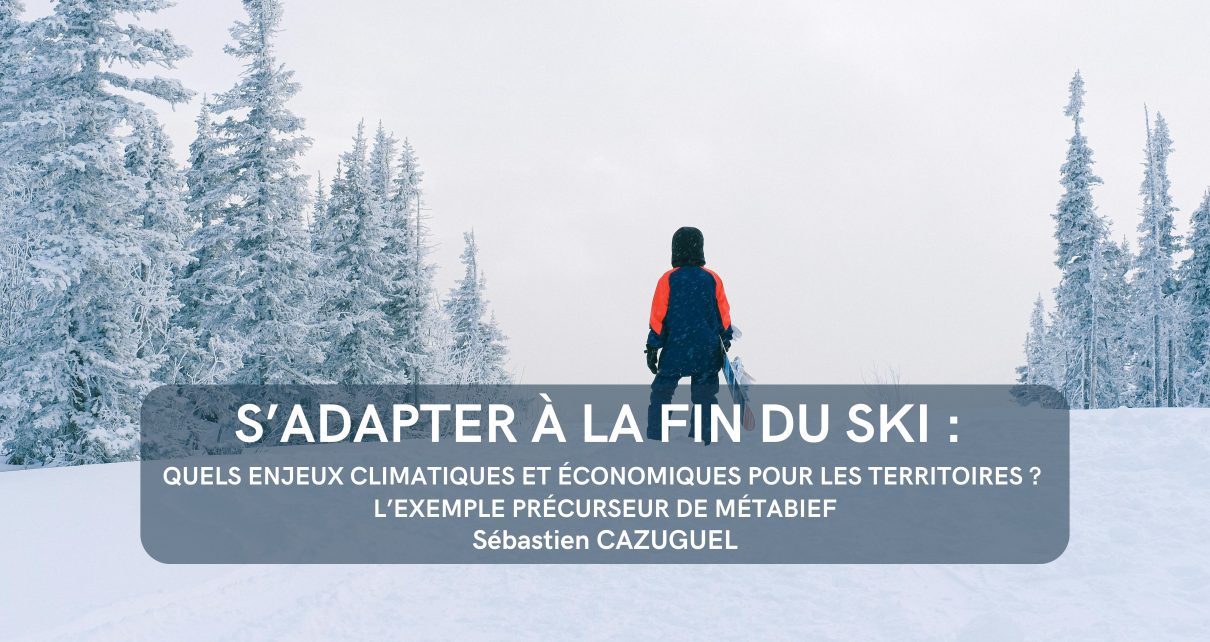Article de Sébastien CAZUGUEL (MS EEDD parcours RSEDD 2025-26) Introduction Les enfants connaîtront-ils la joie de voir la neige en montagne en 2030, 2040 ou 2050 ? Cette question, la station de Métabief a été l’une des premières à se la poser très sérieusement, mettant en place un plan d’adaptation précurseur. Les montagnes sont en effet en première ligne du réchauffement climatique, avec un impact environ deux fois plus rapide[1] qu’en
Article de Patricia PELEY (MS EEDD parcours RSEDD 2025-26) Introduction Il est des rivières qui racontent, à elles seules, le lien profond entre l’homme et la nature. La Risle est de celles-là. Née à 275 mètres d’altitude dans les collines du Perche ornais, elle descend lentement vers la Seine, qu’elle rejoint à Berville-sur-Mer après un voyage de 159 kilomètres. Sur son parcours, elle traverse des paysages multiples - vallées étroites,
Article de Caroline CUVILLARD (MS EEDD parcours RSEDD 2024-25) Introduction La réduction des ressources naturelles entraîne déjà des arbitrages difficiles. L’eau en particulier déclenche des conflits d’usage partout dans le monde. L’Afrique australe souffre de la pire sécheresse depuis des décennies, principalement due au phénomène climatique El Niño, réapparu en 2023, qui crée un climat plus chaud et sec dans certaines régions du monde (En Afrique australe, la sécheresse provoquée
Article de Sana Kouzrou (MS EEDD parcours RSEDD 2025-26) Introduction Les matériaux textiles ne se limitent pas à l’habillement : ils regroupent une vaste catégorie de textiles techniques, conçus pour leurs propriétés mécaniques, thermiques ou chimiques et utilisés dans des secteurs aussi variés que l’automobile, l’aéronautique, le BTP ou l’industrie. Selon la Commission européenne (2021), ces textiles techniques représentent désormais près de 40 % de la production textile mondiale, avec
Article de Bertrand Beaucourt (MS EEDD parcours RSEDD 2025-26) Introduction Alors que le secteur des transports est l’activité qui contribue le plus aux émissions de gaz à effet de serre (GES) en France [1], le train apparaît comme le moyen de transport le plus écologique et peut ainsi être considéré comme celui à développer dans le futur. Néanmoins, le train est perçu comme un moyen de transport onéreux [2] par
Article d’Imane BOUHOUT (MS EEDD parcours RSEDD 2025-26) Introduction L’inflation des prix dans le secteur alimentaire qui frappe la France depuis 2022 a brutalement mis en lumière une réalité : près d’un Français sur six doit désormais restreindre son alimentation faute de moyens suffisants. Un chiffre qui grimpe à 24 % chez les moins de 40 ans selon le CREDOC [1]. Nous assistons à l’émergence d’un système alimentaire à deux vitesses où
Article de Edwige Berthault (MS EEDD parcours RSEDD 2025-26) Introduction L’industrie du cuir est un secteur en croissance marqué par une demande de produits de luxe forte notamment à l’international mais également par la valorisation du savoir-faire artisanal[1]. Par définition, « le cuir est une matière issue de la transformation de la peau d’un animal, rendue imputrescible ».[2] En France, le chiffre d’affaires des industries françaises du cuir (made in France) est
Article de Matthieu Bruneau de la Salle (MS EEDD parcours RSEDD 2025-26) Introduction La fast fashion, en démocratisant les tendances à petit prix, a bouleversé l’industrie textile. Mais l’ultra fast fashion, incarnée par Shein ou Temu, multiplie l’offre à une vitesse inédite : Shein propose jusqu’à 7 200 nouveaux articles quotidiennement. Cette surenchère s’appuie sur des chaînes d’approvisionnement opaques, des stratégies fiscales agressives et néglige les conséquences sociales et écologiques.
Article de Sébastien Guimier (MS EEDD parcours RSEDD 2024-25) Introduction Dans la ville de Chièvres en Belgique, la population a été choquée par la révélation d’une pollution massive de l’eau aux PFAS (substances per- et poly-fluoroalkyles), des polluants chimiques. Dans un article du 23 octobre 2024 (1), Le Monde décrit comment les habitants ont découvert que leur eau potable, jugée "pure" par les autorités, était contaminée, les exposant ainsi à
Article de Romain Lentz (MS EEDD parcours RSEDD 2024-25) Introduction Le secteur du Bâtiment et des Travaux Publics (BTP) génère 70 % des déchets en France [1] et représente 23 % des émissions de Gaz à Effet de Serre (GES), juste derrière les transports. C’est l‘un des plus grands consommateurs d'énergie avec 43 % des consommations énergétiques annuelles françaises[2]. Quand on regarde de plus près l’empreinte carbone d’un bâtiment sur tout son cycle










